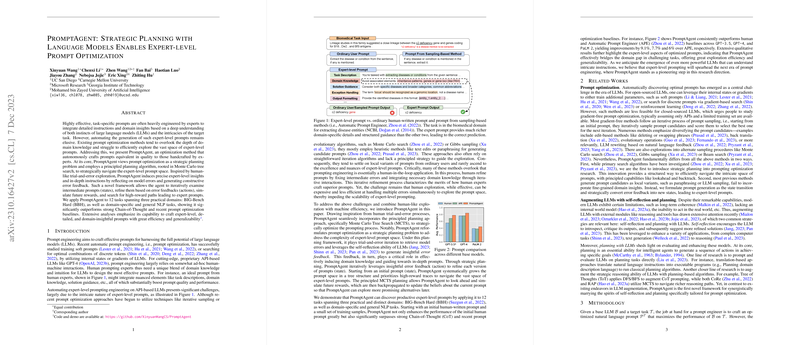Strategic Prompt Optimization with PromptAgent: A Comprehensive Overview
Prompt engineering continues to evolve, presenting opportunities to harness the full capabilities of LLMs. The paper "PromptAgent: Strategic Planning with LLMs Enables Expert-level Prompt Optimization" by Xinyuan Wang et al. proposes a sophisticated optimization technique that autonomously generates expert-level prompts. This research addresses prevailing challenges in prompt optimization, focusing on strategic planning and prompt generalization across various tasks.
Key Contributions and Methodology
The paper introduces PromptAgent, an innovative framework that treats prompt optimization as a strategic planning problem. The authors leverage Monte Carlo Tree Search (MCTS), a principled planning algorithm, to efficiently traverse the complex space of expert-level prompts. This method guides the exploration and refinement of prompts, akin to the meticulous process undertaken by experienced human engineers.
A notable feature of PromptAgent is its mechanism inspired by human trial-and-error processes. The framework iteratively examines intermediate prompts, evaluates them against detected model errors, and refines the prompts based on constructive feedback. This dynamic reflection promotes the integration of precise domain insights and fosters the generation of prompts with increased depth and nuance, reminiscent of expertise in prompt crafting.
PromptAgent applies its framework to 12 varied tasks, spanning domains such as BIG-Bench Hard (BBH) tasks, specialized biomedical tasks, and general NLP challenges. The results are significant, demonstrating performance improvements over Chain-of-Thought (CoT) prompts and recent optimization methods. Key tasks benefit from domain-specific knowledge integrated into the optimized prompts, aiding in effective task completion and highlighting the potency of strategic exploration.
Findings and Numerical Results
The paper reports robust performance gains, emphasizing the practical applicability of expert-level prompts. For instance, it yields performance improvements on strong base models like GPT-3.5, GPT-4, and PaLM 2. Specific tasks showcase improvements ranging from 6% to 9.1% compared to Automatic Prompt Engineer (APE) methods. These results underline the model's constructive impact on task-specific LLM performance, manifesting through meticulous strategic planning and error feedback iteration.
Additionally, the research highlights the adaptability of optimized prompts to various LLM architectures. The transferability to different models, notably GPT-4 and PaLM 2, underscores PromptAgent's potential to elevate foundational LLM capabilities. This adaptability not only exhibits expert prompt robustness but also implies scalability with future advancements in LLM architectures.
Implications and Future Directions
The introduction of PromptAgent has substantial implications for the broader field of AI and LLMs. By streamlining the process of generating expert-level prompts, this research mitigates the dependency on human engineering efforts, marking a shift toward autonomous LLM optimization techniques. Moreover, it opens new avenues for extended research in enhancing LLM generalization capabilities and domain-specific task proficiency.
Future explorations could extend beyond strategic prompt optimization, considering the incorporation of more advanced planning algorithms and error handling methodologies. Furthermore, investigating compressed expert-level prompt representations without performance degradation could enhance implementation efficiency, especially in environments with resource constraints.
Conclusion
This paper advances the state of the art in prompt optimization by strategically integrating planning into LLM prompt crafting processes. Through the innovative application of MCTS and a focus on detailed error feedback, PromptAgent advances the capabilities of LLMs, highlighting its critical role in the ongoing evolution of prompt engineering strategies. The promising results and implications for future LLM developments reinforce the value and necessity of such frameworks in modern AI research.
